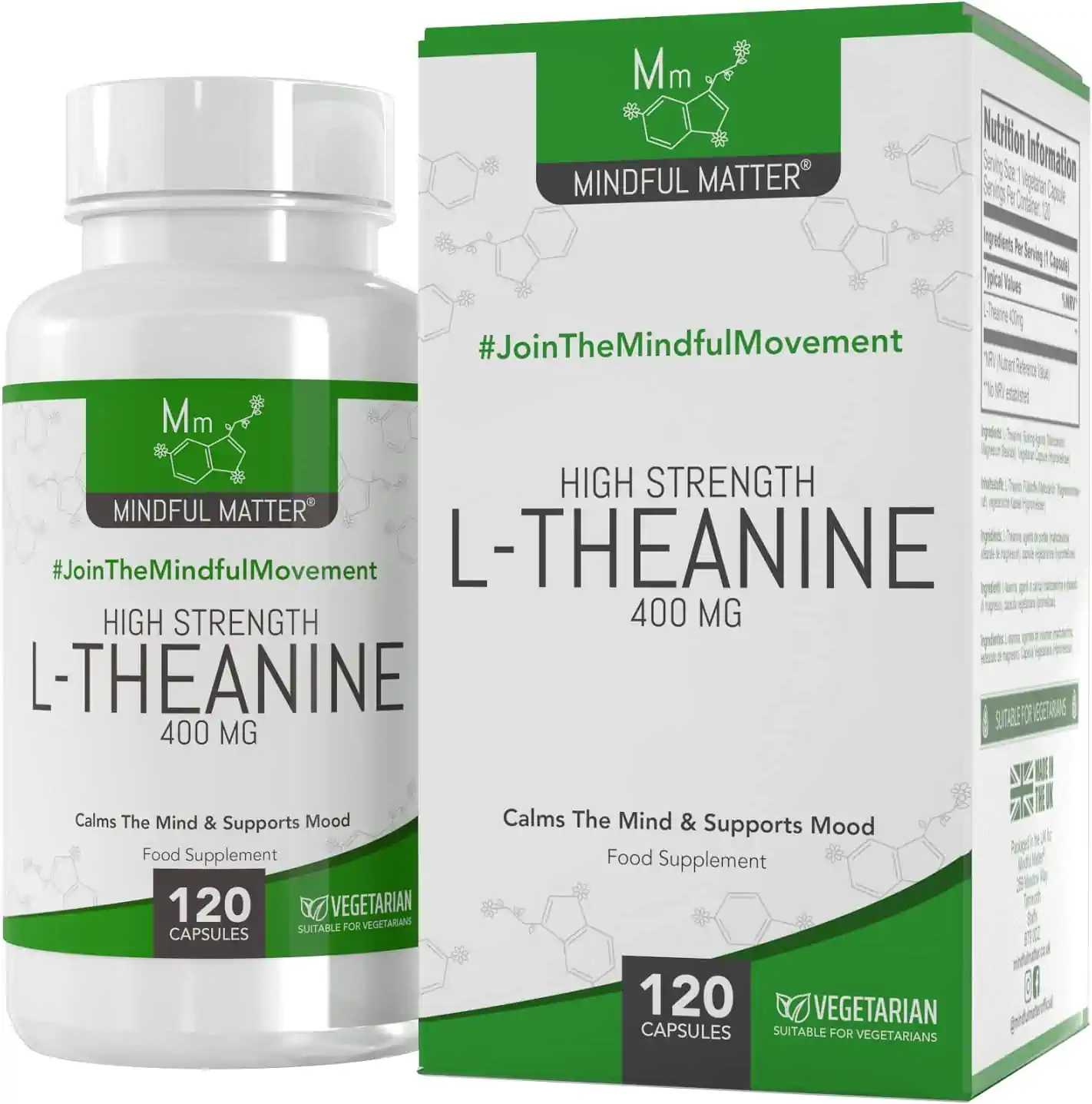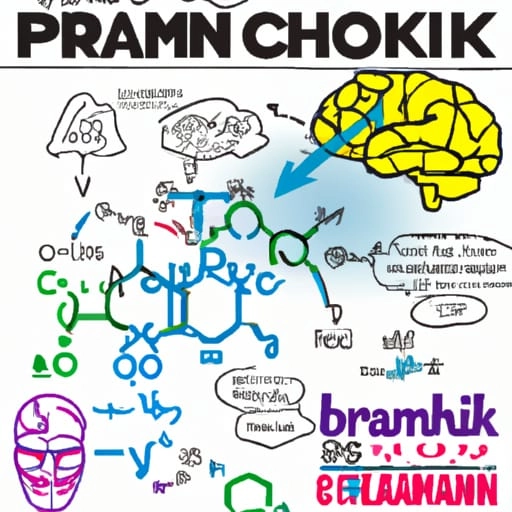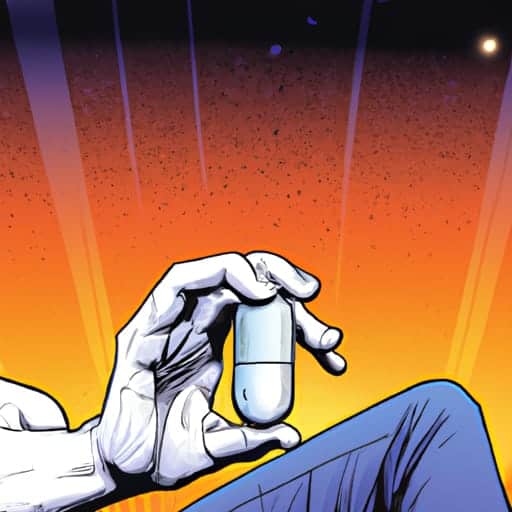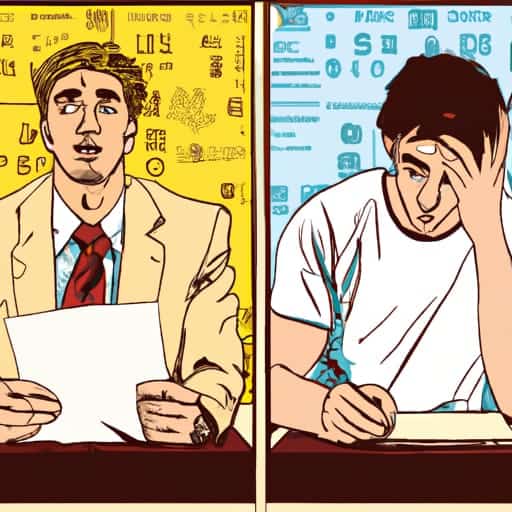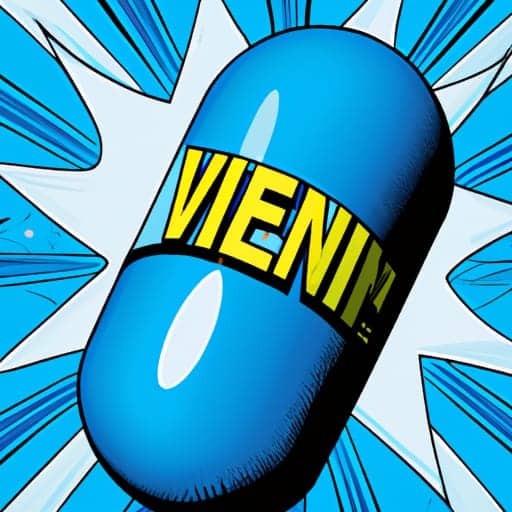Can Taking L-Theanine Nootropic Reduce Anxiety?
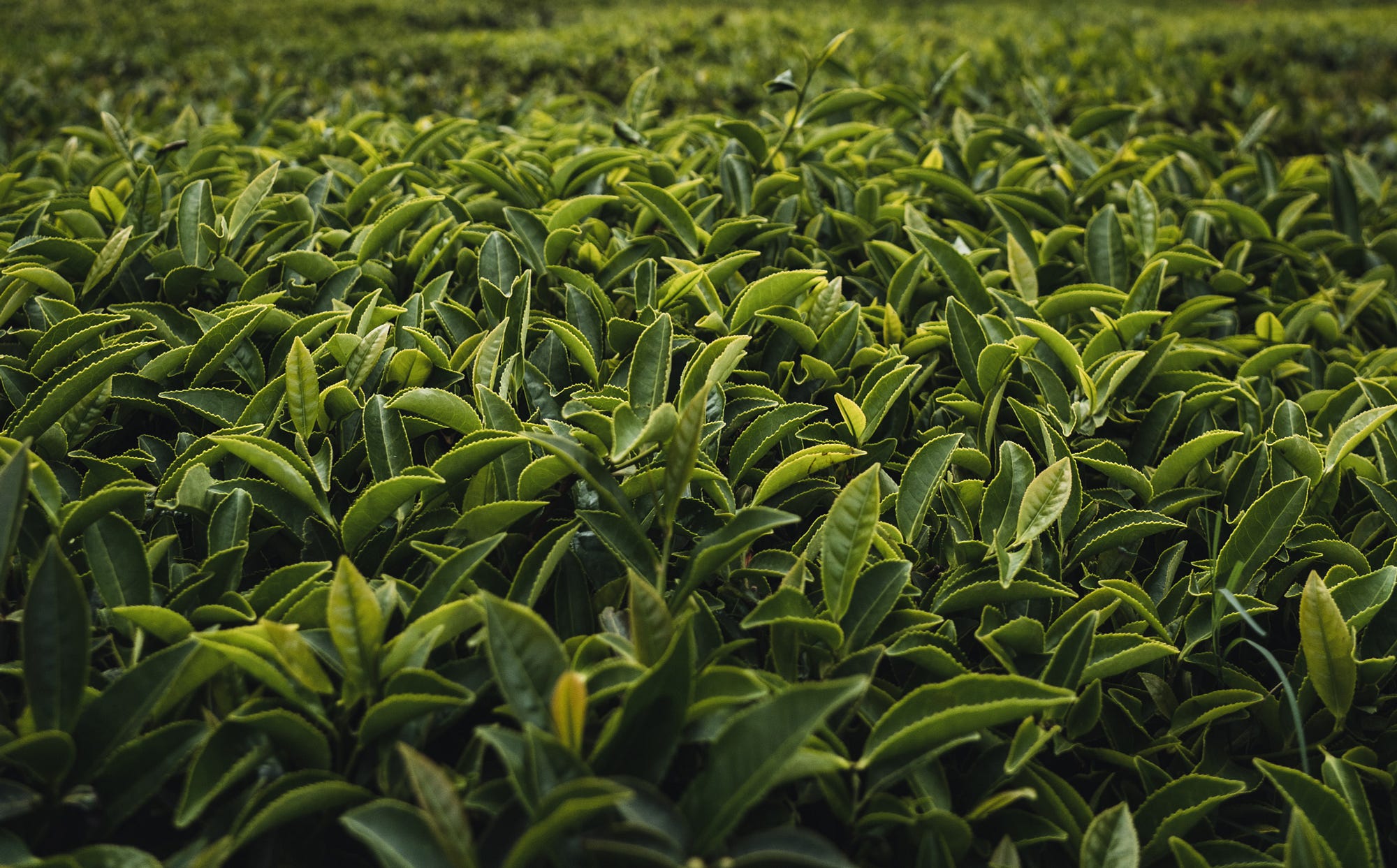
Did L Theanine nootropic reduce my Anxiety? Will it Reduce Your Anxiety?
People these days, particularly employees in competitive jobs, or entrepreneurs building their own start-ups want to get an edge.
Driven people want to be more efficient. They invest courses, books, apps to enhance their workflow, and very often try to improve their bodies and minds too.
Why do people do this? Sometimes it’s about fostering enhancements and driving improvement. That’s about being competitive.
But sometimes it’s not about competing with anyone; we are just on fire to be the best we can be.
And efficiency doesn’t stop at things. Over the past few years, I’ve got on the bandwagon. I’ve got the books, done the courses, got the apps, and I track pretty much everything.
But as I became more ‘productive’, I found that I was doing more, and I was getting more and more tired and stressed.
Sleep was worse. I just had more tasks to complete, and in doing more, I got more worn out.
Striving for productivity made me a lot more stressed!
I looked for something to help me relax. I didn’t want to use alcohol or prescribed medication. I wanted something milder, but something legal too.
Nootropics are psychoactive substances usually derived from plants, some of which have been used in different cultures to enhance mental functions.
Some promise to make you more alert, others promise to chill you out. Some do both.
L-theanine is said to give a relaxed alertness without the jitters of caffeine and without the sedation of some other substances.
There are some large studies about different nootropics, but the only way to find out whether L-theanine would work for me was to experiment.
N=?
In scientific studies, the shorthand to show how many people took part in the study is n=100.
The hundred here means that is the number of participants in that particular study.
Some of the big drug studies have hundreds of participants, and population studies such as dietary research can have tens of thousands of participants over a long period of time.
Generally, the more participants in the study, the more reliable the results are taken to be.
So if you go the that Camelot of Evidence-Based Medicine, the Cochrane Library, you will see that the best regarded results come from combining lots of big studies, in these cases the ‘n’ number gets enormous.
The question in the big drug studies is:
How certain are we that substance X does some good, and no harm?
The trouble with huge studies is that the individual gets lost. We get statistics, averages, modes and medians. These statistics can seem very distant from personal experience.
A 4% chance of a pharmaceutical helping someone is all very well, but will it help me?
Placebo
Usually, in a drug study, one group will be given the active substance, and the other an inactive substance called the placebo. The scientists try to measure how much better their drug is than the placebo.
For example, an antidepressant Amitryptiline was found to be just over twice as effective as the placebo substance in beating depression.
Big new study confirms antidepressants work better than placebo
“Antidepressants are highly effective and should be prescribed to millions more people with mental health problems…www.nhs.uk
Comparative efficacy and acceptability of 21 antidepressant drugs for the acute treatment of adults…
All antidepressants were more efficacious than placebo in adults with major depressive disorder. Smaller differences…www.thelancet.com
In a study of statins in heart failure, where n=10,192, statins were claimed to reduce risk of hospitalization versus placebo, but not all-cause mortality (ie. they weren’t amazing at stopping you dying in general).
Meta-analysis of randomized controlled trials of statins versus placebo in patients with heart…
This review concluded that statins were safe, improved heart function (left ventricular ejection fraction), and…www.ncbi.nlm.nih.gov
Biohacking
While the big pharmaceutical companies and science, in general, might rely on averages and small effects that are still statistically significant, I wanted to know about the effect of L-theanine on me.
That’s how we get experiments where n=1. The study consists of one person. Biohackers experiment on themselves.
However, the studies themselves are otherwise often very scientific. My favourite n=1 guy is Dave Feldman, the cholesterol kid, who has had more blood tests and published more results of his self-experiments than anyone else on earth.
He’s a big hero of mine and if you are at all concerned about your cholesterol and what your numbers mean, go check him out.
Dave has produced evidence from his self-experiments that truly kicks over everything established science thought (and still thinks) about cholesterol.
What is L-theanine?
L-theanine is a naturally occurring non-essential amino acid (that is an amino acid your body doesn’t produce, but you don’t need it to live).
However, humans have been consuming it for thousands of years in the form of tea. Both black and green tea contain L-theanine as well as caffeine.
There have been many claims made for L-theanine, from it helping to prevent pancreatic cancer, to enhancing your sleep, making you relax without sedating you, reducing anxiety and helping cardiovascular health.
It positively regulates nitric oxide. So does viagra. Just saying.
L-theanine Chemistry
You are a bioelectrical engine. Your body runs on chemical reactions and some of those chemical reactions produce electrical reactions allowing you to think, walk and make your heart beat. All pretty useful.
Most of our pharmaceuticals come from plants ultimately. Plants, because they can’t run away from predators have become amazing chemists and they produce a whole bunch of chemical compounds that mimic the hormones and neurotransmitters in animals.
These plant-based chemicals are usually designed either to kill the animals who eat the plants or make the animals want to eat the plants more (or at least parts of them).
But don’t fall into the common trap of believing that because a substance is plant based and ‘natural’ it is safe. Think strychnine, cyanide and deadly nightshade.
L-theanine may work because it is very close in chemical structure to an essential neurotransmitter called glutamate.
Because it is shaped like glutamate it may open the gates in the cells that that glutamate does.
Glutamate is the primary excitatory neurotransmitter, while GABA is the primary relaxing neurotransmitter in your brain.
Alcohol and other relaxants increase GABA, and GABA reduced anxiety.
If L-theanine acts as an analog for glutamate, this might explain why L-theanine is supposed to help you sleep and also boost attentiveness and task-switching efficiency.
So that’s a plausible mechanism for how L-theanine might do what it’s supposed to do.
But just because something’s plausible doesn’t mean it’s true. That’s a trap we often fall into, and it’s a big leap from maybe to certain. ’
This is why we need to experiment.
Method
I took 350mg L-theanine each morning with about 145mg of caffeine. My caffeine was from coffee through a V60 drip into a mug which was about 8 fluid ounces US, or 240ml.
This very useful article discusses absorption times for L-theanine
Effects of L-theanine or caffeine intake on changes in blood pressure under physical and…
L-theanine, an amino acid contained in green tea leaves, is known to block the binding of L-glutamic acid to glutamate…www.ncbi.nlm.nih.gov
It concludes that highest blood plasma levels (so maximum effect) is between 32 and 52 minutes after consumption, and its half-life is between 5 and 4 minutes. Therefore I would feel the effect just short of an hour, and the effect would be gone completely after two hours roughly.
Qualitative Comments
For the first few days, I did not notice any difference. I felt the effect of the caffeine, but could not say that I felt any more alert or relaxed. I still felt slight coffee jitters.
As the week went on, I felt distinctly more chilled and at peace. A couple of life events happened that would normally wind me up, but I was very calm about them.
My sleep did not feel qualitatively better. I noticed no Viagra-like effects, despite L-theanine’s positive regulation of nitric oxide.
Comments from my journal:
17/9/20 @ 12;30 “Some diarrhoea” (sorry!)
18/9/20 @ 09:30 “Jittery, but good.”
19/9/20 @ 10:11 “Feel good, but sunshine?”
21/9/20 @ 10:30 “Slight gripey stomach.”
23/9/2020 c 08:30 “I feel good and relaxed”
23/9/2020 @ 09:45 “A feeling of well-being”
23/9/2020 @ 11:48 “Sudden mild anxiety”
23/9/2020 @ 18:30 “Feel good. Mood 9/10. Very chilled.”
Last 350mg dose of L-theanine on 23/9/2020. On 24/9/2020 I had a normal cup of coffee with the same amount of caffeine, but no L-theanine.
24/9/2020 @ 09:20 “Feeling jittery, tired and light-headed.”
24/9/2020 @ 10:00 “Weak legs, slight anxiety. A feeling of jamais vu, the clock in my car seems unfamiliar, in the wrong place. Slight feeling but weird.”
2/9/2020 @ 12:00 “Everything now normal. Feel fine.”
I wonder if I wasn’t getting a slight discontinuation effect after stopping the L-theanine?
Quantitative Figures from the L-theanine Week
I have includes several variables. I didn’t include body temperature though I might do that for further experiments. I included the weather because I know if affects my mood.
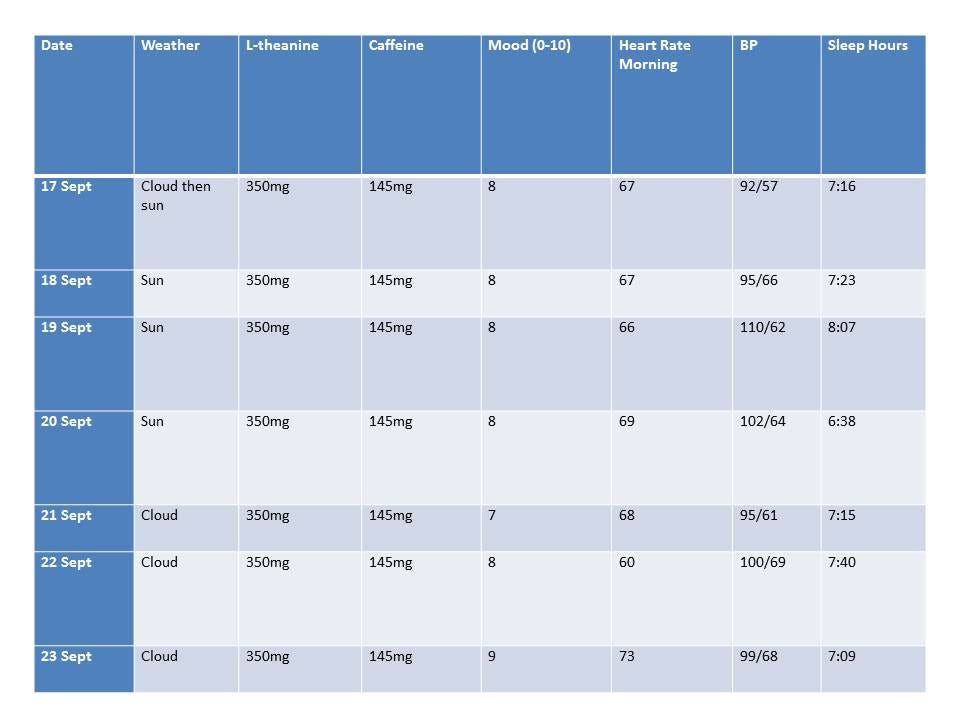
Quantitative Figures from a week with no L-theanine
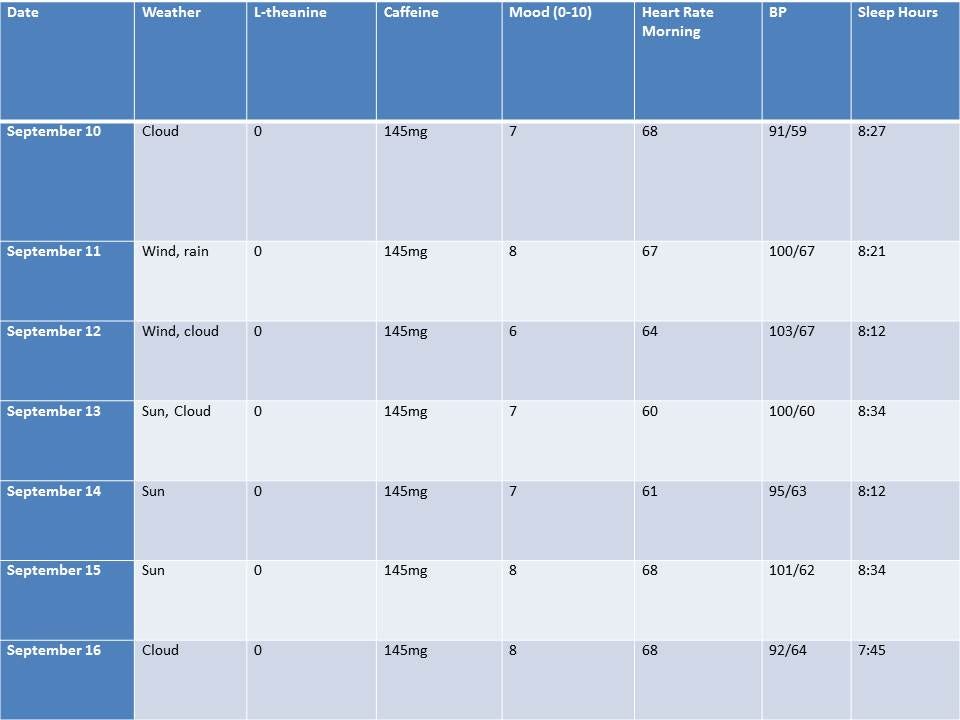
Did it work?
I was definitely not as manic this week as I was when I wrote my first thoughts on nootropics. Weirdly, I seemed to get marginally less sleep.
There are studies that show scientifically that the l-theanine has a psychoactive effect. My n=1 experiment didn’t produce much of a change in my baseline measurements of heart rate, mood, sleep-duration, blood-pressure.
However, subjectively, I definitely felt more chilled and had a sense of well-being as the week went on. On stopping, I seemed to experience a discontinuation. Not terrible, nowhere as bad as an alcohol hangover, but this tends to prove that the l-theanine did definitely do something.
Should You Use It?
You are you with your own genetics, environment and medical history. I am certainly not recommending you put things in your body. That decision is yours alone.
However, for myself. I do feel that in the week I experimented with l-theanine, it had subjectively positive effects.
So should you use it? I can’t say. Should I use it? I probably will.

